Implementing the stack with
a dynamic array
- The stack can
be implemented using a
dynamic array:
- A (fixed size)
array
- The stackTop
delineating
the actual number of
elements stored in
the stack:
Schematically:
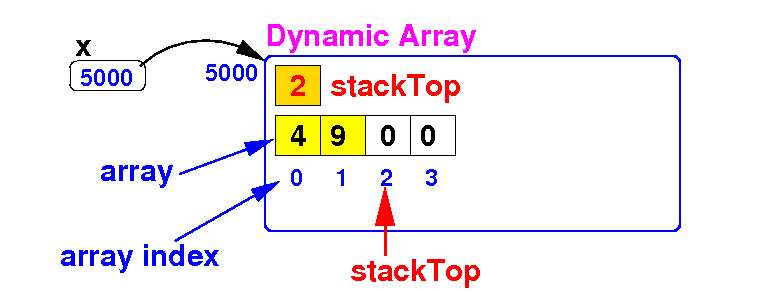
|
- The array is
increased
only when
the push( ) operation
encounters a
full array
- The array is
reduced when
the occupancy drops
below a
certain threshold
|
The original implementation
of the push( ) method
-
Recall:
the
implementaion of the
push( ) method
for a fixed size array:
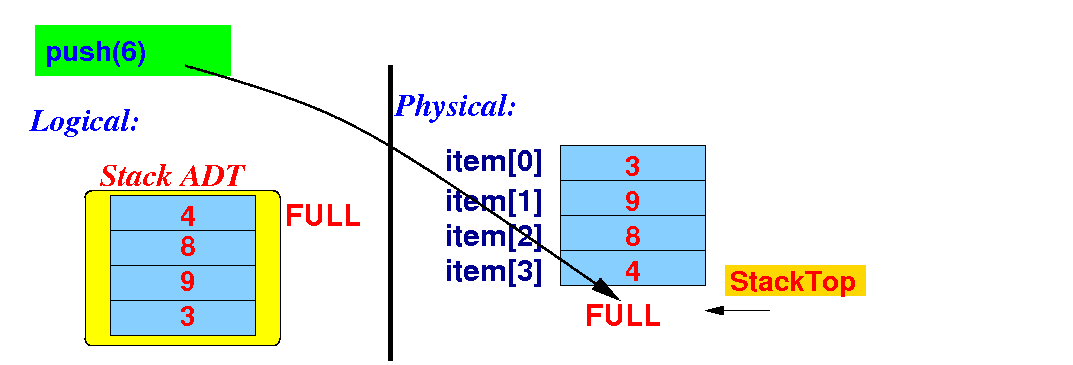
public void push(Integer e)
{
if ( isFull () ) // Change what to do when FULL
{
System.out.println("Full");
return ;
}
item[ stackTop ] = e; // (1) store item
stackTop++; // (2) increment stackTop
}
|
|
The implementation
of the push( ) method
for a dynamic stack
- When
the array is
full,
the push() method
will
double the
array size and
then
push the
new element:
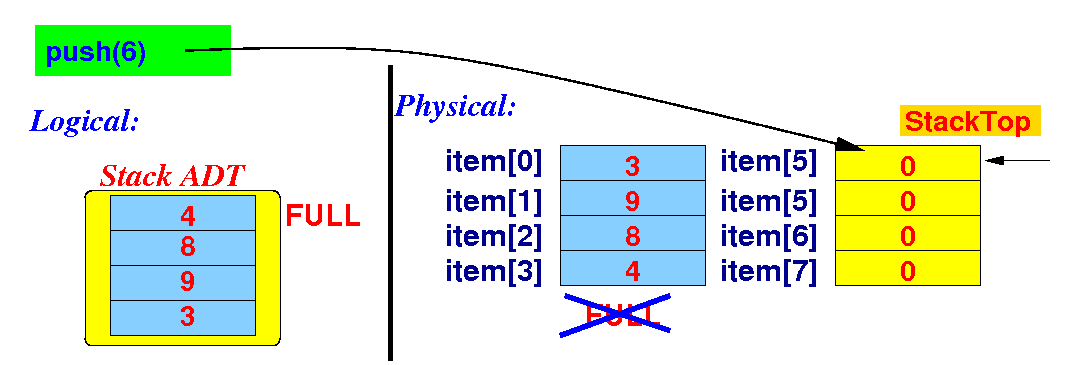
public void push(Integer e)
{
if ( isFull () ) // Change what to do when FULL
{
// Double the array size
return ; // Do NOT return, but continue !
}
item[ stackTop ] = e; // (1) store item
stackTop++; // (2) increment stackTop
}
|
|
The implementation
of the push( ) method
for a dynamic stack
- The push( ) algorithm
for a dynamic
stack:
public void push(Integer e)
{
if ( isFull () )
{
// Double the array size
Integer[] temp = new int[ 2*item.length ];
for ( int i = 0; i < item.length; i++ )
temp[i] = item[i];
item = temp;
}
item[ stackTop ] = e; // (1) store item
stackTop++; // (2) increment stackTop
}
|
|
The implementation
of the push( ) method
for a dynamic stack
The implementation
of the push( ) method
for a dynamic stack
The implementation
of the push( ) method
for a dynamic stack
A original implementation
of the pop method
-
Recall:
the
implementaion of the
pop( ) method
for a
fixed size array:
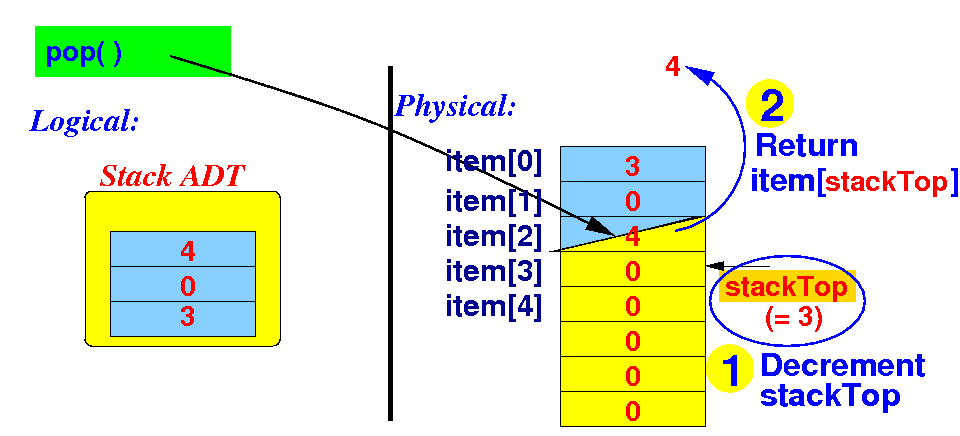
public Integer pop( )
{
if ( isEmpty () )
{
System.out.println("Empty");
return null;
}
stackTop--; // (1) decrement stackTop
Integer retVal = item[ stackTop ];
return retVal; // (2) return item
}
|
|
A implementation
of the pop method
for a
dynamic array
- When the
occupancy
falls below some threshold,
the
pop() method
will reduce
the
array size by
halve:
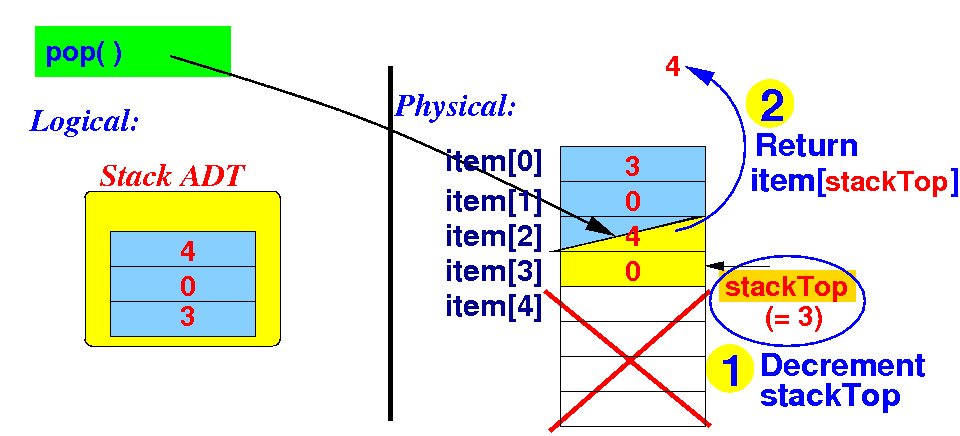
public Integer pop( )
{
if ( isEmpty () )
{
System.out.println("Empty");
return null;
}
stackTop--; // (1) decrement stackTop
Integer retVal = item[ stackTop ];
if (stackTop < δ*item.length) reduce array by halve
return retVal; // (2) return item
}
|
|
The
implementation
of the
pop( ) method
for a dynamic stack
- The
pop( ) algorithm
for a dynamic
stack:
public Integer pop( )
{
if ( isEmpty () )
{
System.out.println("Empty");
return null;
}
stackTop--; // (1) decrement stackTop
Integer retVal = item[ stackTop ];
// if (stackTop < δ*item.length) reduce array by halve
if ( statckTop < δ*item.length )
{
temp = new int[ 2*item.length ];
for ( int i = 0; i < item.length; i++ )
temp[i] = item[i];
item = temp;
}
return retVal; // (2) return item
}
|
|
The
implementation
of the
pop( ) method
for a dynamic stack
- (1)
create a
new array that is
half the
current size:
public Integer pop( )
{
if ( isEmpty () )
{
System.out.println("Empty");
return null;
}
stackTop--; // (1) decrement stackTop
Integer retVal = item[ stackTop ];
// if (stackTop < δ*item.length) reduce array by halve
if ( statckTop < δ*item.length )
{
temp = new int[ item.length/2 ];
for ( int i = 0; i < item.length; i++ )
temp[i] = item[i];
item = temp;
}
return retVal; // (2) return item
}
|
|
The
implementation
of the
pop( ) method
for a dynamic stack
- (2)
copy the
element to the
new array:
public Integer pop( )
{
if ( isEmpty () )
{
System.out.println("Empty");
return null;
}
stackTop--; // (1) decrement stackTop
Integer retVal = item[ stackTop ];
// if (stackTop < δ*item.length) reduce array by halve
if ( statckTop < δ*item.length )
{
temp = new int[ item.length/2 ];
for ( int i = 0; i <= stackTop; i++ )
temp[i] = item[i];
item = temp;
}
return retVal; // (2) return item
}
|
|
The
implementation
of the
pop( ) method
for a dynamic stack
- (3)
make item
reference
to the new array:
public Integer pop( )
{
if ( isEmpty () )
{
System.out.println("Empty");
return null;
}
stackTop--; // (1) decrement stackTop
Integer retVal = item[ stackTop ];
// if (stackTop < δ*item.length) reduce array by halve
if ( statckTop < δ*item.length )
{
temp = new int[ item.length/2 ];
for ( int i = 0; i <= stackTop; i++ )
temp[i] = item[i];
item = temp;
}
return retVal; // (2) return item
}
|
|
The
implementation
of the
pop( ) method
for a dynamic stack
- (4)
we must only
reduce
array size
when
its size ≥ 2:
public Integer pop( )
{
if ( isEmpty () )
{
System.out.println("Empty");
return null;
}
stackTop--; // (1) decrement stackTop
Integer retVal = item[ stackTop ];
// if (stackTop < δ*item.length) reduce array by halve
if ( statckTop < δ*item.length && item.length >= 2 )
{
temp = new int[ item.length/2 ];
for ( int i = 0; i <= stackTop; i++ )
temp[i] = item[i];
item = temp;
}
return retVal; // (2) return item
}
|
|
$64,000 question:
what value do we use for
δ ?
Why
δ = 0.5
is a terrible choice
DEMO:
demo/09-stack/02-dyn-array/Demo2.java
Intro to
running time analysis...
- Consider the
push( ) algorithm
using a dynamic array:
public void push(Integer e)
{
if ( isFull () )
{
// Double the array size
Integer[] temp = new int[ 2*item.length ];
for ( int i = 0; i < item.length; i++ )
temp[i] = item[i]; // Store
item = temp;
}
item[ stackTop ] = e; // Store
stackTop++; // (2) increment stackTop
}
|
-
On average,
how many
"store" statements
are executed for each
push( ) invocation
?
|
Intro to
running time analysis...
Intro to
running time analysis...
Intro to
running time analysis...
-
Suppose
we have execute
N push( ) operations:
# times exec push(): 1 2 3 4 5 6 7 8 ... N
------------------------------------------
# store statements
to store item pushed: 1 1 1 1 1 1 1 1 ... 1
# store statements
to double array: 1 2 4 8 ...
# Total store statements executed
for N push( ) invocations:
(1 + 1 + ... 1) + (1 + 2 + 4 + ... K) where K = 2??? ≤ N
≤ N + 2*K where K = 2??? ≤ N
≤ N + 2*NN
Average # store statements for 1 push( ) invocation = (N + 2N) / N
= 1 + 2 = 3
|
|
Intro to
running time analysis...
-
Each push( ) invocation
will use
1 store
statement
to store the
item pushed:
# times exec push(): 1 2 3 4 5 6 7 8 ... N
------------------------------------------
# store statements
to store item pushed: 1 1 1 1 1 1 1 1 ... 1
# store statements
to double array: 1 2 4 8 ...
# Total store statements executed
for N push( ) invocations:
(1 + 1 + ... 1) + (1 + 2 + 4 + ... K) where K = 2??? ≤ N
≤ N + 2*K where K = 2??? ≤ N
≤ N + 2*NN
Average # store statements for 1 push( ) invocation = (N + 2N) / N
= 1 + 2 = 3
|
|
Intro to
running time analysis...
- The
stack
is full
when the
array size is equal
to
2K
==>
we need use
2K store statements
to
copy
the array in the
array doubling operation:
# times exec push(): 1 2 3 4 5 6 7 8 ... N
------------------------------------------
# store statements
to store item pushed: 1 1 1 1 1 1 1 1 ... 1
# store statements
to double array: 1 2 4 8 ...
# Total store statements executed
for N push( ) invocations:
(1 + 1 + ... 1) + (1 + 2 + 4 + ... K) where K = 2??? ≤ N
≤ N + 2*K where K = 2??? ≤ N
≤ N + 2*NN
Average # store statements for 1 push( ) invocation = (N + 2N) / N
= 1 + 2 = 3
|
|
Intro to
running time analysis...
- The
total # of
store statements
used in the
execution of
N
push( ) calls
is equal to the
sum of the
2 cases:
# times exec push(): 1 2 3 4 5 6 7 8 ... N
------------------------------------------
# store statements
to store item pushed: 1 1 1 1 1 1 1 1 ... 1
# store statements
to double array: 1 2 4 8 ... M ≤ N
# Total store statements executed
for N push( ) invocations:
(1 + 1 + ... 1) + (1 + 2 + 4 + ... M) where M ≤ N
≤ N + 2*K where K ≤ N
≤ N + 2*NN
Average # store statements for 1 push( ) invocation = (N + 2N) / N
= 1 + 2 = 3
|
|
Intro to
running time analysis...
- 1 + 1 + ... + 1 = N
1 + 2 + 4 + ... + M
= ???
# times exec push(): 1 2 3 4 5 6 7 8 ... N
------------------------------------------
# store statements
to store item pushed: 1 1 1 1 1 1 1 1 ... 1
# store statements
to double array: 1 2 4 8 ... M ≤ N
# Total store statements executed
for N push( ) invocations:
(1 + 1 + ... 1) + (1 + 2 + 4 + ... M) where M ≤ N
= N + ??? where M ≤ N
≤ N + 2*NN
Average # store statements for 1 push( ) invocation = (N + 2N) / N
= 1 + 2 = 3
|
|
Intro to
running time analysis...
- 1 + 1 + ... + 1 = N
1 + 2 + 4 + ... + M
= ???
# times exec push(): 1 2 3 4 5 6 7 8 ... N
------------------------------------------
# store statements
to store item pushed: 1 1 1 1 1 1 1 1 ... 1
# store statements
to double array: 1 2 4 8 ... M ≤ N
# Total store statements executed
for N push( ) invocations:
(1 + 1 + ... 1) + (1 + 2 + 4 + ... M) where M ≤ N
= N + ??? where M ≤ N
Let: S = 1 + 2 + 4 + ... M
|
|
Intro to
running time analysis...
- 1 + 1 + ... + 1 = N
1 + 2 + 4 + ... + M
= ???
# times exec push(): 1 2 3 4 5 6 7 8 ... N
------------------------------------------
# store statements
to store item pushed: 1 1 1 1 1 1 1 1 ... 1
# store statements
to double array: 1 2 4 8 ... M ≤ N
# Total store statements executed
for N push( ) invocations:
(1 + 1 + ... 1) + (1 + 2 + 4 + ... M) where M ≤ N
= N + ??? where M ≤ N
Let: S = 1 + 2 + 4 + ... M
2S = 2 + 4 + 8 + ... 2M
|
|
Intro to
running time analysis...
- 1 + 1 + ... + 1 = N
1 + 2 + 4 + ... + M
= ???
# times exec push(): 1 2 3 4 5 6 7 8 ... N
------------------------------------------
# store statements
to store item pushed: 1 1 1 1 1 1 1 1 ... 1
# store statements
to double array: 1 2 4 8 ... M ≤ N
# Total store statements executed
for N push( ) invocations:
(1 + 1 + ... 1) + (1 + 2 + 4 + ... M) where M ≤ N
= N + ??? where M ≤ N
Let: S = 1 + 2 + 4 + ... M
2S = 2 + 4 + 8 + ... 2M
|
|
Intro to
running time analysis...
- 1 + 1 + ... + 1 = N
1 + 2 + 4 + ... + M
= ???
# times exec push(): 1 2 3 4 5 6 7 8 ... N
------------------------------------------
# store statements
to store item pushed: 1 1 1 1 1 1 1 1 ... 1
# store statements
to double array: 1 2 4 8 ... M ≤ N
# Total store statements executed
for N push( ) invocations:
(1 + 1 + ... 1) + (1 + 2 + 4 + ... M) where M ≤ N
= N + ??? where M ≤ N
Let: S = 1 + 2 + 4 + ... M
2S = 2 + 4 + 8 + ... 2M
2S - S = 2M - 1
|
|
Intro to
running time analysis...
- 1 + 1 + ... + 1 = N
1 + 2 + 4 + ... + M
= 2M - 1
# times exec push(): 1 2 3 4 5 6 7 8 ... N
------------------------------------------
# store statements
to store item pushed: 1 1 1 1 1 1 1 1 ... 1
# store statements
to double array: 1 2 4 8 ... M ≤ N
# Total store statements executed
for N push( ) invocations:
(1 + 1 + ... 1) + (1 + 2 + 4 + ... M) where M ≤ N
= N + 2*M - 1 where M ≤ N
≤ N + 2*NN
Average # store statements for 1 push( ) invocation = (N + 2N) / N
= 1 + 2 = 3
|
|
Intro to
running time analysis...
- 1 + 1 + ... + 1 = N
1 + 2 + 4 + ... + M
= 2M - 1
# times exec push(): 1 2 3 4 5 6 7 8 ... N
------------------------------------------
# store statements
to store item pushed: 1 1 1 1 1 1 1 1 ... 1
# store statements
to double array: 1 2 4 8 ... M ≤ N
# Total store statements executed
for N push( ) invocations:
(1 + 1 + ... 1) + (1 + 2 + 4 + ... M) where M ≤ N
= N + 2*M - 1 where M ≤ N
≤ N + 2*N - 1 = 3N - 1
Average # store statements for 1 push( ) invocation = (N + 2N) / N
= 1 + 2 = 3
|
|
Intro to
running time analysis...
- Therefore, the
average number of
store statements
per execution of 1
push( ) is:
# times exec push(): 1 2 3 4 5 6 7 8 ... N
------------------------------------------
# store statements
to store item pushed: 1 1 1 1 1 1 1 1 ... 1
# store statements
to double array: 1 2 4 8 ... K ≤ N
# Total store statements executed
for N push( ) invocations:
(1 + 1 + ... 1) + (1 + 2 + 4 + ... K) where K = 2??? ≤ N
= N + 2*K - 1 where K ≤ N
≤ N + 2*N - 1 = 3N - 1
Average # store statements for 1 push( ) invocation = (3N - 1) / N
~= 3
|
|
Run time analysis will
give you a precise result on
the efficiency of
the algorithm !
❮
❯




